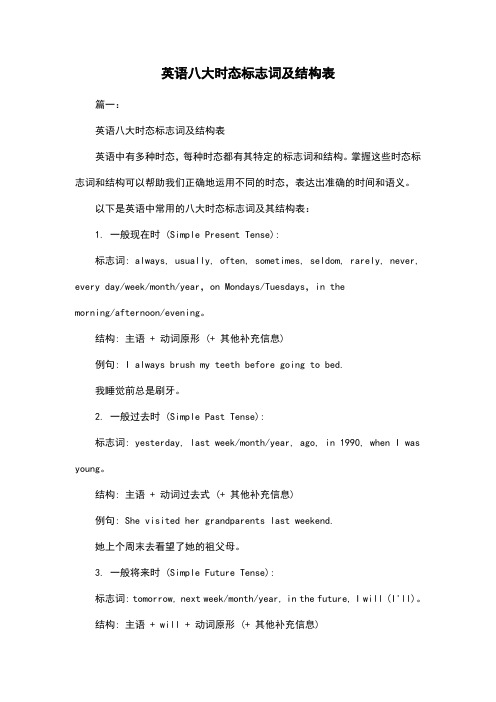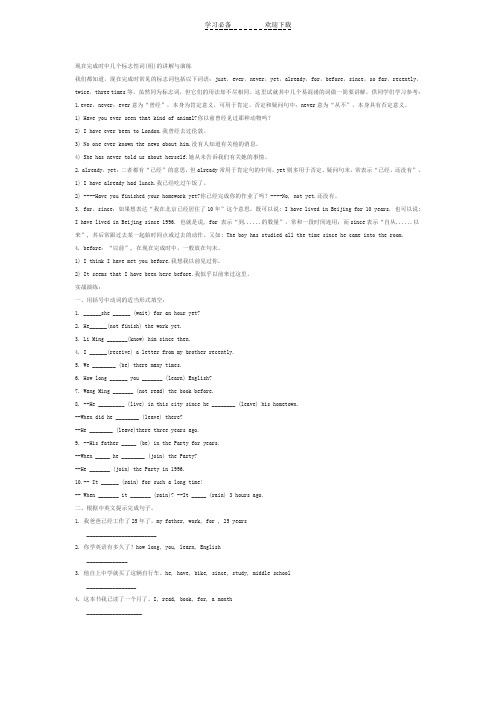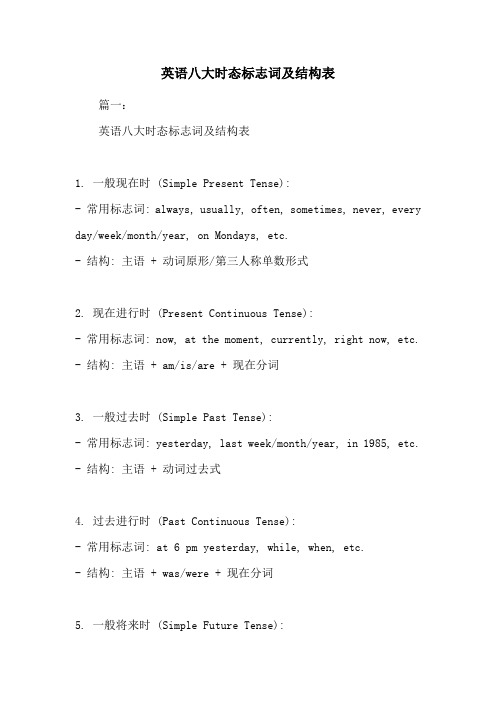现在完成时态的标志词
英语12种时态的标志词

英语12种时态的标志词英语有12种主要时态,它们分别是:简单现在时、现在进行时、现在完成时、一般过去时、过去进行时、过去完成时、一般将来时、将来进行时、将来完成时、现在完成进行时、过去完成进行时和过去将来时。
下面我将分别列举它们的标志词:1. 简单现在时,always, usually, often, sometimes, seldom, never, every day, week, month, year, on Mondays, etc.2. 现在进行时,now, right now, at the moment, at present, today, this week/month/year, etc.3. 现在完成时,just, already, yet, ever, never, so far, up to now, recently, lately, for, since, etc.4. 一般过去时,yesterday, last week/month/year, in 1990, the other day, ago, etc.5. 过去进行时,while, when, as, at (a certain time),etc.6. 过去完成时,by the time, already, just, never, ever, yet, so far, since, for, how long, etc.7. 一般将来时,tomorrow, next week/month/year, in 2023, soon, etc.8. 将来进行时,this time tomorrow, this time nextweek/month/year, in a week/month/year's time, etc.9. 将来完成时,by the time, in a week/month/year, etc.10. 现在完成进行时,for, since, how long, all day, all morning, all afternoon, etc.11. 过去完成进行时,by, before, when, until, etc.12. 过去将来时,would, was/were going to, would be, etc.以上是这12种时态的标志词,它们有助于我们理解句子所表达的时间和动作关系。
23个现在完成时的标志词

23 个现在完成时的标志词(如to date)t到目前为止) , today, 当然ever, never, jus(t 方才/刚刚), alread(y已经), ye(。
则this morning/week/year也是可以使用现在完成时,并非是大多数原——出现以下的词汇,通常使用“现在完成时”结构。
1)ever since, since, since th—en— 3 个2)by now, so far, till/until now, up to now—— 5 个3)before, lately, recently—— 3 个4)in recent years;in the past—— 2 个—— 2 个6)This/That/It is +段5)in/for/over/during the last/past +时间最高级结构⋯(that) +从句用现完—— 1 个(th用at现) +完—7)This/That/It is the first/second ⋯tim从e句a t)用+现完—— 1 个— 1 个8)This/That/It is the only ⋯(从t h句9)不很常见的up to the present, to date, thus fa—r — 3 个10)不很常见的long ago, from—— 2 个——以上的划分是为了讲解记忆的方便而已。
1.ever since, since, since the—n — 3 个ever since, since中的since可以是副词,也可以是介词、连词;since then为介词 +名词(或副词)结构《朗文英语语法》第309页9.25.2与 since和for 连用的现在完成时since和 for 常与现在完成时连用,表示直到现在的时段。
since(+时点)可用作:since连词:.从小就不在家了。
Tom hasn’t been home since he was a bo汤y姆since副词:I saw Fiona in May and I haven ’t seen her since.我 5 月份见过菲奥娜,此后我就没有再见过她了。
英语八大时态标志词及结构表

英语八大时态标志词及结构表篇一:英语八大时态标志词及结构表英语中有多种时态,每种时态都有其特定的标志词和结构。
掌握这些时态标志词和结构可以帮助我们正确地运用不同的时态,表达出准确的时间和语义。
以下是英语中常用的八大时态标志词及其结构表:1. 一般现在时 (Simple Present Tense):标志词: always, usually, often, sometimes, seldom, rarely, never, every day/week/month/year,on Mondays/Tuesdays,in themorning/afternoon/evening。
结构: 主语 + 动词原形 (+ 其他补充信息)例句: I always brush my teeth before going to bed.我睡觉前总是刷牙。
2. 一般过去时 (Simple Past Tense):标志词: yesterday, last week/month/year, ago, in 1990, when I was young。
结构: 主语 + 动词过去式 (+ 其他补充信息)例句: She visited her grandparents last weekend.她上个周末去看望了她的祖父母。
3. 一般将来时 (Simple Future Tense):标志词: tomorrow, next week/month/year, in the future, I will (I'll)。
结构: 主语 + will + 动词原形 (+ 其他补充信息)例句: We will go shopping tomorrow.我们明天去购物。
4. 现在进行时 (Present Continuous Tense):标志词: now, at the moment, currently, right now, look!。
现在完成时中几个标志性词

现在完成时中几个标志性词(组)的讲解与演练我们都知道,现在完成时常见的标志词包括以下词语:just,ever,never,yet,already,for,before,since,so far,recently,twice,three times等。
虽然同为标志词,但它们的用法却不尽相同。
这里试就其中几个易混淆的词做一简要讲解,供同学们学习参考:1.ever,never:ever意为“曾经”,本身为肯定意义,可用于肯定、否定和疑问句中;never意为“从不”,本身具有否定意义。
1) Have you ever seen that kind of animal?你以前曾经见过那种动物吗?2) I have ever been to London.我曾经去过伦敦。
3) No one ever known the news about him.没有人知道有关他的消息。
4) She has never told us about herself.她从未告诉我们有关她的事情。
2. already,yet:二者都有“已经”的意思,但already常用于肯定句的中间,yet则多用于否定、疑问句末,常表示“已经,还没有”。
1) I have already had lunch.我已经吃过午饭了。
2) ----Have you finished your homework yet?你已经完成你的作业了吗?----No, not yet.还没有。
3. for,since:如果想表达“我在北京已经居住了10年”这个意思,既可以说: I have lived in Beijing for 10 years. 也可以说:I have lived in Beijing since 1996. 也就是说, for 表示“到......的数量”,常和一段时间连用;而since表示“自从......以来”, 其后常跟过去某一起始时间点或过去的动作。
英语八大时态标志词及结构表

英语八大时态标志词及结构表篇一:英语八大时态标志词及结构表1. 一般现在时 (Simple Present Tense):- 常用标志词: always, usually, often, sometimes, never, every day/week/month/year, on Mondays, etc.- 结构: 主语 + 动词原形/第三人称单数形式2. 现在进行时 (Present Continuous Tense):- 常用标志词: now, at the moment, currently, right now, etc. - 结构: 主语 + am/is/are + 现在分词3. 一般过去时 (Simple Past Tense):- 常用标志词: yesterday, last week/month/year, in 1985, etc. - 结构: 主语 + 动词过去式4. 过去进行时 (Past Continuous Tense):- 常用标志词: at 6 pm yesterday, while, when, etc.- 结构: 主语 + was/were + 现在分词5. 一般将来时 (Simple Future Tense):- 常用标志词: tomorrow, next week/month/year, in the future, etc.- 结构: 主语 + will + 动词原形6. 将来进行时 (Future Continuous Tense):- 常用标志词: this time next week/month/year, at 8 pm tomorrow, etc.- 结构: 主语 + will be + 现在分词7. 现在完成时 (Present Perfect Tense):- 常用标志词: already, yet, just, ever, never, so far, etc. - 结构: 主语 + have/has + 过去分词8. 过去完成时 (Past Perfect Tense):- 常用标志词: by the time, before, after, etc.- 结构: 主语 + had + 过去分词以上是英语八大时态标志词及其对应结构表。
现在完成时态的标志词

★一般现在时:often, usually, always, sometimes, never, seldom, everyweek/day/year/month..., once a week, on Sundays★一般过去时:ago, yesterday, the day before yesterday, last week/year/night/month..., in 1989, just now, at the age of five, one day, ago, long ago, once upon a time, then(那时), on that day,★现在进行时:now, at this time, these days, Listen! Look! at this moment/time★过去进行时:at this time yesterday,at that time或"when + 一般过去时从句", at 1:00 last night★现在完成时:recently, recent years, these days/years, lately, since, for + 时段, in the past few years, ever since, in the last five months, up to now, since then, so far, ever, never, yet, lately, once, twice, three/four times..., already, before, just. ★过去完成时:before, by the end of last year/term/month...★一般将来时:tomorrow, next day/week/month/year..., soon, in a few minutes, by..., the day after tomorrow, in the future★过去将来时:the next day/morning/year...,the following month/week...现在完成时:already, yet, so far, as yet, lately ,recently,thesedays/weeks/years, until now, up to now, since+ 时间点, for+时间段, in the last/past( few years)等过去式:以前的某个时间点如yesterday,one year ago等,in the past一般现在时:always, usually, often, sometimes等现在完成时英语16种时态中不易掌握的一种时态,不仅用法法复杂,而且还通常要与某些特定的词语连用。
现在完成时与过去完成时讲解

现在完成时1.现在完成时态表示过去发生的动作对现在造成的影响或结果。
本时态标志词:already (“已经”,用于肯定句中,放在have /has之后或句尾);yet (“仍然”“还”,用于疑问句或否定句的句尾)just(“刚刚”,放在have /has之后);before(“以前”,放在句尾);ever(“曾经”,放在have /has之后)never (“从没有”,在have /has之后)例句:1.Our teacher has just left.2.We have studied English already.3.I have not finished the homework yet.4.He has never been to Beijing before.例:I have just turned off the light. 我刚刚把灯关上。
(结果是灯已经关上了)She has lost her bike.她把自行车丢了。
(影响是他现在没有自行车骑了)The rain has stopped now.雨已经停了。
(结果是我们可以出门了)I have already read the book.我已读过这本书了。
(结果是已知道这本书的内容)She has had a good education.她受到过良好的教育。
(影响是她文化水平高,有修养)2.某个动作从过去已经开始,一直持续到现在,还有可能持续到将来.(也可能不继续下去),常同包括现在在内的时间状语连用,如:today, now, this week, this morning, these days, this afternoon, recently, so far等动作的持续性要通过一段时间来表示一段时间的表达方法有两种:for: +一段时间for a year for two weeks for three yearsSince +过去的某一时刻, since nine since last weekSince +一般过去时态的时间状语从句since you came ; since you got hom e.例:We have had much snow this winter. 今年冬天多雪。
英语9大时态和时间标志词

英语9大时态和时间标志词英语中有九种主要的时态,它们是:1. 一般现在时(Simple Present):-时间标志词:always, usually, often, sometimes, every day, once a week, etc.2. 一般过去时(Simple Past):-时间标志词:yesterday, last week, two days ago, in 1990, etc.3. 一般将来时(Simple Future):-时间标志词:tomorrow, next week, in the future, soon, etc.4. 现在进行时(Present Continuous):-时间标志词:now, at the moment, currently, today, etc.5. 过去进行时(Past Continuous):-时间标志词:while, when, at 5 o'clock yesterday, etc.6. 将来进行时(Future Continuous):-时间标志词:at this time tomorrow, in an hour, etc.7. 现在完成时(Present Perfect):-时间标志词:since, for, just, already, yet, ever, never, recently, etc.8. 过去完成时(Past Perfect):-时间标志词:before, after, by the time, by, until, etc.9. 将来完成时(Future Perfect):-时间标志词:by the time, before, by, in, etc.请注意,这些时间标志词并不是绝对的,有时它们可能会在多个时态中使用,具体使用时要根据句子语境来判断。
- 1、下载文档前请自行甄别文档内容的完整性,平台不提供额外的编辑、内容补充、找答案等附加服务。
- 2、"仅部分预览"的文档,不可在线预览部分如存在完整性等问题,可反馈申请退款(可完整预览的文档不适用该条件!)。
- 3、如文档侵犯您的权益,请联系客服反馈,我们会尽快为您处理(人工客服工作时间:9:00-18:30)。
★一般现在时:often, usually, always, sometimes, never, seldom, everyweek/day/year/month..., once a week, on Sundays★一般过去时:ago, yesterday, the day before yesterday, last week/year/night/month..., in 1989, just now, at the age of five, one day, ago, long ago, once upon a time, then(那时), on that day,★现在进行时:now, at this time, these days, Listen! Look! at this moment/time★过去进行时:at this time yesterday,at that time或"when + 一般过去时从句", at 1:00 last night★现在完成时:recently, recent years, these days/years, lately, since, for + 时段, in the past few years, ever since, in the last five months, up to now, since then, so far, ever, never, yet, lately, once, twice, three/four times..., already, before, just. ★过去完成时:before, by the end of last year/term/month...★一般将来时:tomorrow, next day/week/month/year..., soon, in a few minutes, by..., the day after tomorrow, in the future★过去将来时:the next day/morning/year...,the following month/week...现在完成时:already, yet, so far, as yet, lately ,recently,thesedays/weeks/years, until now, up to now, since+ 时间点, for+时间段, in the last/past( few years)等过去式:以前的某个时间点如yesterday,one year ago等,in the past一般现在时:always, usually, often, sometimes等现在完成时英语16种时态中不易掌握的一种时态,不仅用法法复杂,而且还通常要与某些特定的词语连用。
本文对现在完成时通常连用的词语作一归纳,供大家参考。
一、since不管since 是用作介词、连词还是副词,它通常都与现在完成时连用。
如:Charles has worked hard since leaving school. 自从离开学校以来查尔斯工作一直很努力。
(since为介词) Great changes have taken place here since 1978. 自1978年以来这里发生了巨大的变化。
(since为介词)Her reading has improved greatly since she changed schools. 自从她转校以来,她的阅读水平提高了很多。
(since为连词) You haven’t changed muchfy; mso-char-indent-count: 2.0; mso-char-indent-s since we last met. 自从上次我们见面以来,你变化不大。
(since为连词) She moved to London last May and has since got a job on a newspaper. 她去年五月到伦敦,此后一直在报社工作。
(since为副词) He left sch ool in 1983. I haven’t seen him since. 他1983年离开学校。
打那时起我一直没见过他。
(since为副词)【几点说明】1. 表示时间长度时,通常用一般现在时代替现在完成时。
如:How long is it since you arrived? 你到来多久了?It is [=has been] ten years since he left here. 他离开这儿已10年了。
2. 对于某些表示状态(如seem等)的动词,或因句义等方面的原因,有时可能用一般现在时比用现在完成时更合适。
如:It seems like years since we last met. 我们似乎几年未见面了。
Since when does the $42 plus $5 service charge come to $48? 从什么什候开始42元加5元的服务费等于48元了? 3. 若不是指从过去持续到现在,而是指从较远的过去持续到一个较近的过去,则用过去完成时。
比较:He hasn’t eaten anything since Tuesday. 自星期二以来他一直未吃东西。
(自星期二以来他一直未吃东西。
指从星期二到现在未吃东西)Yesterday he told me that he hadn’t eaten anything since Tuesday. 他昨天告诉我自星期二以来他一直未吃任何东西。
(指从星期二至昨天未吃东西二、in the last five years类似于in the last five years的时间状语,它若表示从现在算起的过去一段时间内,通常要与现在完成时连用。
如:This company has come a long way in the last five years. 最近五年这个公司已经前进了一大步。
The house has changed hands three times in the last two years. 在过去两年中,这栋房子已转手三次。
Is that the sum of what you’ve done in the last two years? 这就是你最近两年中完成的全部数量吗?【注】其中的介词in有时也可换成for, during, over, within 等,有时也可省去。
如:I have been here for the last two weeks. 最近两周我一直在这里。
Over the last few years, prices have fallen sharply. 在过去的几年中,价格已急剧下降了。
My business has decreased during the last two months. 最近两个月内,我的生意减少了。
另外,若不是表示从现在算起的过去一段时间,则不用现在完成时。
如:Jim managed two goals in the last ten minutes. 在最后的10分钟内,吉姆设法得了两分。
【比较】I didn’t see much of Harry in the last months. 在最后的几个月中,我很少看见哈里。
I haven’t seen much of Harry in the last months. 在最近的几个月中,我很少看见哈里。
三、in the past five years类似于in the past five years的时间状语,它表示从现在算起的过去一段时间,因此通常要与现在完成时连用。
如:的时间状语,它表示从现在算I’ve seen little of her in the past few weeks. 近几周我很少见到她。
We’ve plantedthousands of trees in the past five years. 过去五年我们种了成千上万棵树。
Population has increased by 200% in the past 25 years. 人口在过去25年内增加了200%。
【注】其中的介词in有时也可换成for, during, over, within 等,有时也可省去。
如:He’s bee n in a coma for the past six weeks. 在过去的六个星期中,他一直昏迷不醒。
People have changed their diets a lot over the past few years. 在过去的几年中,人们的饮食习惯已改变了很大。
Within the past few minutes, the President has issued a statement. 在过去的几分钟里,总统发表了一项声明。
另外,有时可能用含有情态动词的完成式。
如:I must have slept three hours in the past day and a half. 在过去的一天半时间里,我肯定只睡了三个小时。
四、over the yearsover the years 的意思是“这些年来”“经过这么多年之后”“最近几年”,通常表示的是从现在算起的过去几年,因此通常与现在完成时连用。
如:She’s brought us so much happiness over the years. 这些年来,她给我们带来了不少的幸福。
We’ve had a few arguments over the years, but in general we get on very well. 最近几年来,我们争吵过几次,但总的说来,我们相处得很好。
Women’s social status hasn’t changed much over the years. 这些年来妇女的社会地位没有多大改变。
Over the years I’ve learnt to remember how to survive, and how to forget pain. 这些年来,我已经学会了记住怎样挣扎求生和怎样忘却痛苦。
【注】当不强调对现在的影响时,该短语有时也可与一般过去时或过去完成时连用。
如:Over the years, her love for him deepened. 在过去的几年中,她对他的爱进一步加深了。
